Everyone has that game that turned them into a tabletop gamer. For some it’s CATAN, for others it’s Magic the Gathering. For me, it was Dominion. After playing this game for many years, I’m excited to tell you everything you need to know about Dominion.
Dominion: a Quick Overview
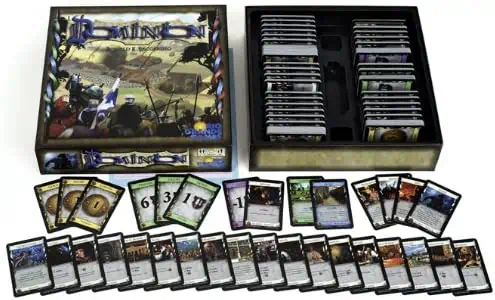
No. of players: 2-4
Designer: Donald X. Vaccarino
Approx. play time: 30 mins
Dominion is a classic deck-building board game. A staple on any board gamer’s shelf, Dominion is a simple yet highly rewarding game that is easy for newbies and families to play while also having plenty of strategy for experienced gamers. Because you don’t need to use the same setup every game, Dominion also has great replayability, especially once you start adding expansions to your game.
In This Guide
Here’s what I’ll cover in this guide — everything from essential info to my advice for new and experienced players based on my many years playing this game and its expansions.
How to play Dominion: The essentials — aim of the game, set up, gameplay, and end game rules.
Best Dominion strategies — these are my go-to strategies and aimed at anyone playing the base game, though some can be used in expansions.
Best Dominion expansions — there are loads of expansions out there, so here are my top five.
Best games like Dominion — if you love Dominion as much as me, you’ll enjoy my top five games like Dominion.
How to Play Dominion: the Essentials
The Aim of the Game
Like many Euro games, the aim of Dominion is to gain victory points. This is done by purchasing Victory cards using coins, which in the base game are: an Estate, worth one victory point, a Duchy, worth three, and a Province, worth six. There are also some Kingdom cards that have a victory point score, such as Gardens, which are worth one point for every ten cards in your hand.
In order to purchase Victory cards, you’ll need to purchase Kingdom cards and strengthen your deck so you can buy enough Victory cards to win the game.
How to Set Up Dominion
Setting up Dominion is quick and easy:
- Lay out your decks of Treasure cards (base game: Copper, Silver, and Gold) and Victory cards and the Trash mat.
- Select ten types of Kingdom cards and lay them out. These and the Treasure and Victory cards make up the Supply.
- Each player is dealt three Estate cards and seven Coppers. Shuffle these and place them face down to create your deck.
- Each player draws five cards from their deck and a first player is chosen at random.

Gameplay
In Dominion, your turn will consist of three phases: Action, Buy, and Clean Up. Each turn you get one action and one buy, but these can be increased using Kingdom cards. In Dominion, you should announce what you are doing to the other players and place any cards you play in front of you for everyone to see. Here is a brief explanation of each phase.
Action Phase
Taking an action in Dominion means playing a Kingdom card from your hand (you won’t have any in your first turn). Kingdom cards have a gray box with what they can do. Many Kingdom cards allow you to pick up more cards, generate more actions, or generate more buys. Some cards also let you ‘attack’ other players while others let you ‘react’ by playing that card during someone else’s turn when its requirement is fulfilled.
If your card has a line on it, the instructions on top of the line are the card’s actions. Anything below that line happens at a different time, such as when you react to another player attacking you.
Each card clearly tells you what it does, so learning the mechanics of each card is simply a case of reading them! If you are uncertain about a card, you’ll find clear explanations of every card in the rulebook.
Buy Phase
Once you’ve taken all of your actions, you enter the buy phase. This is when you can purchase Kingdom cards, Treasure cards, or Victory cards using the Treasure cards in your hand and any additional coins you’ve gained from playing Kingdom cards.
Every card has a cost in the bottom left corner. This is how much you need to pay for it using Treasure cards. When you buy a card, you ‘gain it’, meaning it goes on top of your discard pile.
Similarly to actions, you get one buy per turn but plenty of Kingdom cards give you additional buys, which come in handy once you start picking up and generating more coins each turn.
Clean Up Phase
Once you have finished your buy phase, it’s time to clean up. Take all cards you have played and all cards in your hand, along with any cards you’ve purchased, and place them on top of your discard pile in any order.
Next, you draw up to five cards again. If your deck has less than five cards in it, simply shuffle your discard pile, place it facedown under your deck, and draw five cards.
End of Game
There are two ways for a game of Dominion to end:
- Any three piles in the Supply are empty.
- The Province pile is empty.
Most games I’ve played end with the Province pile being emptied. Either way, each player will now go through their deck and tally up their victory points. The player with the most points wins the game.

Best Dominion Strategies
Big Money
This strategy is so well-known amongst Dominion players, it is pretty much Dominion canon. Big Money is simple — spend your coins on Silver and Gold treasure cards. While other players fumble their thin strategies trying to buy lots of interesting action cards, you’ll be buying Provinces in no time and speeding along end game before they can even put together eight coins in a hand.
Big Money is a simple strategy and for many Dominion players, it’s a frustratingly powerful one that they regard as ‘breaking’ the game. But it can definitely be beaten by strong action and attack combinations. Attacks are especially effective against Big Money as cards like Militia force players to reduce their hand to 3 cards and Witch will weigh down their hand with curses.
Actions ASAP
A pretty basic strategy, if one can even call it that, is to pick up extra action cards as soon as possible. In the base set, Village should be an early purchase. Cellar is also great as it allows you to discard and draw cards and then gives you another action, so you can be certain you can make use of an action you pick up.
There’s nothing more frustrating than a hand full of action cards and only one action, so, especially early game, you should prioritize extra action cards over extra buy cards, which only start to come in handy once you have more coins to spend on your turn.
Militia Your Opponents
While the Witch is a tempting attack card and sending Curse cards into your opponents’ decks is lots of fun, I don’t think it’s an especially effective strategy unless you buy a ton of Witches, which are expensive and don’t provide any additional coins or actions. Instead, I’d recommend picking up 1-3 Militia cards as soon as possible.
Militia gives you two extra coins and forces your opponents to reduce their hand to three cards. This can really hobble other players on their turns, especially early in the game when their decks are slim and give you an early advantage. Be sure to pick up some Moats too, as these will defend you against Militia if other players start copying your strategy.
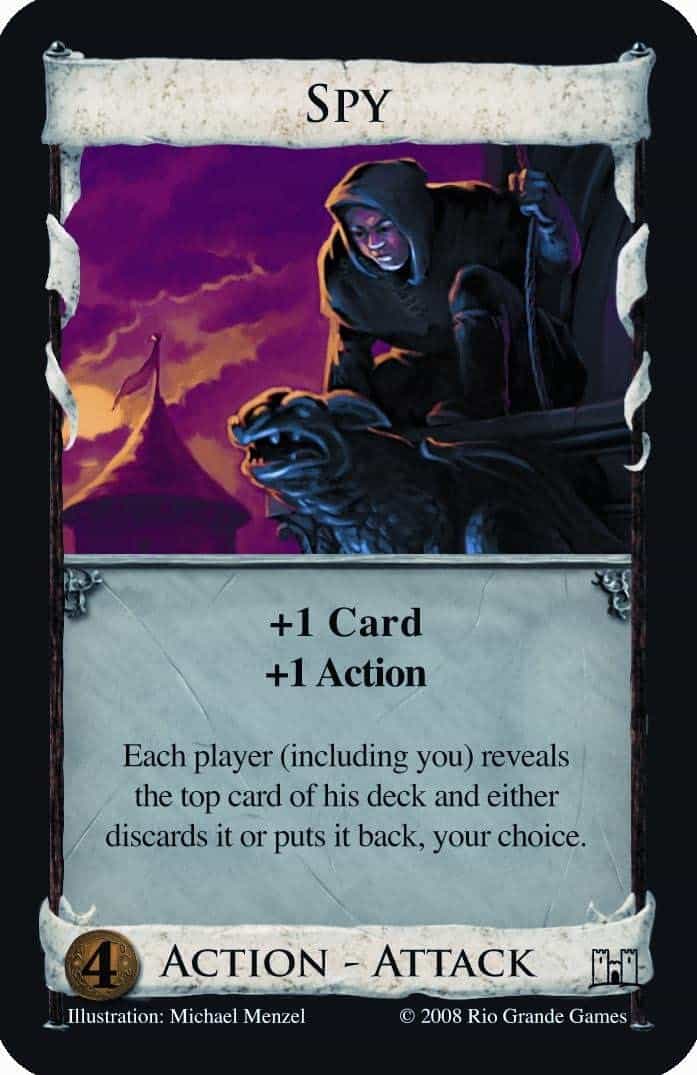
Remodel Your Gold
This is my personal favorite. It feels like it should be illegal, but it isn’t. It’s a mid-to-late game strategy for grabbing those all important Province cards.
You’ll need to buy 2-3 Remodel cards midway through the game, which cost four coins, maybe even a fourth in the second half of the game. Then, as soon as you’re able to, buy Gold cards, which cost six coins.
Remodel cards let you trash a card from your hand and gain a card costing up to two coins more than it. So when a Remodel and a Gold appear in your hand, you can trash the Gold and gain a Province.
Don’t use this strategy too early, as you need coins to purchase all-important action cards and you don’t want to burden your deck with too many Provinces early on, but the Remodel/Gold combo is great in the latter half of the game to grab Provinces without needing eight coins in your hand.
GARDENS
Does the supply have the Gardens card? If so, buy it. Seriously. These cards are a little OP in my opinion, and we all end up fighting over them. That’s because each Gardens card is worth one victory point for every ten cards in your hand at the end of the game.
This might not sound like much, but a standard game of Dominion will end with you having somewhere between 40 and 80 cards in your hand, depending on the particular set up you have. That can make Gardens card almost as valuable as Provinces at the end of the game.
If you’ve snagged plenty of Gardens cards and end up having some slow turns at the end of the game, load up on Coppers, which cost nothing, to bulk up your deck. You might also consider investing in cards that give you plenty of Buys so you can also grab a Copper or two in your buy phase.
The Best Dominion Expansions
Dominion: Seaside
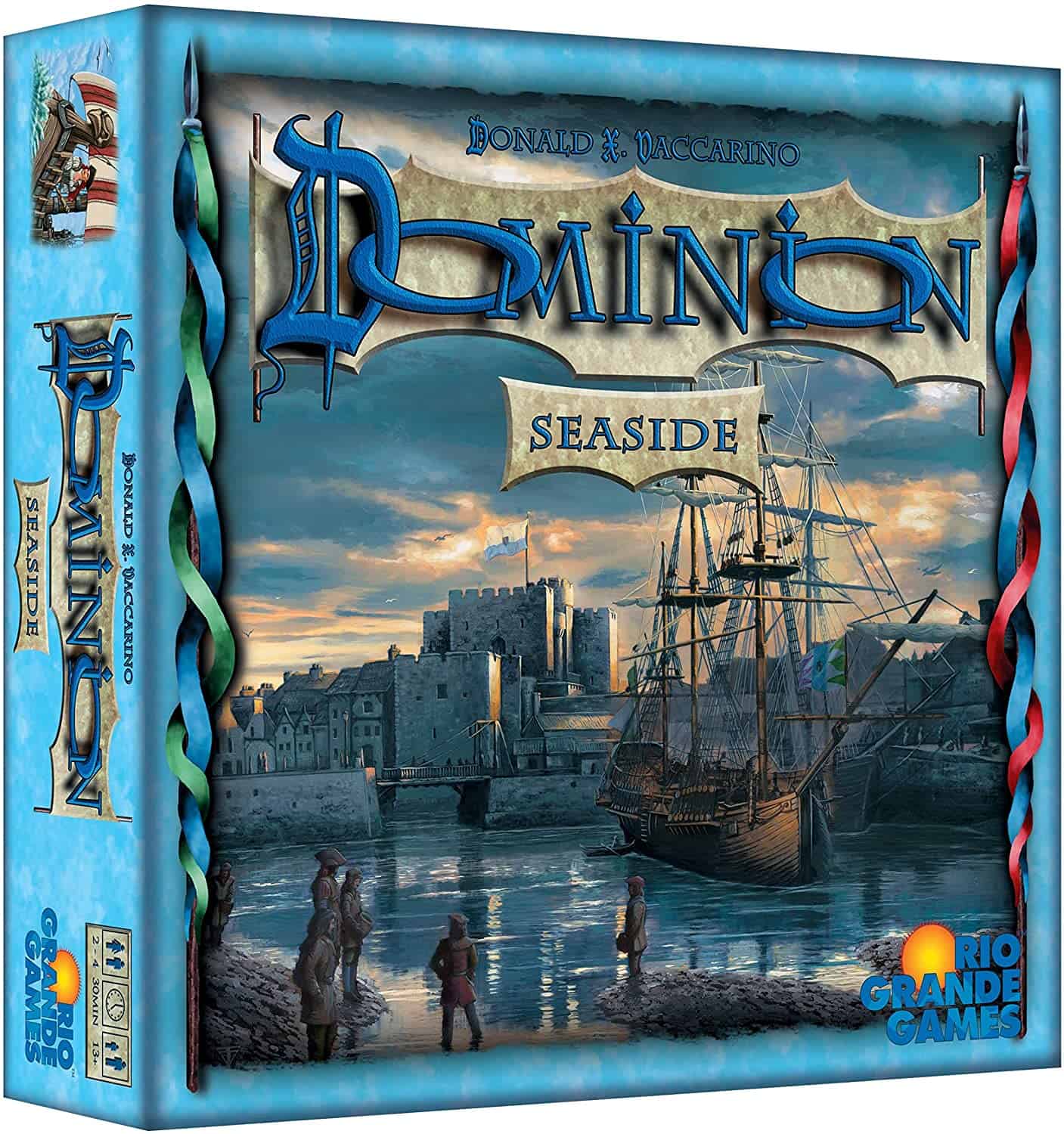
If you only buy one Dominion expansion, it should be Dominion: Seaside. Seaside adds a bunch of cool new mechanics with its cards, including ‘Duration’ action cards that stay out after your turn until your next turn and are played again that turn. Seaside also adds mats to the game, which allow you to store cards on it until later or the end of the game so you can create a slicker deck.
I have the first edition, but in 2022 a second edition of Seaside was released. I haven’t played this version yet, but friends tell me it’s as good as the first so long as you don’t have a strong affection for the Embargo card, which is certainly an annoying card, but an interesting one nonetheless, since it prevents players from buying particular cards.
Dominion: Intrigue (2nd edition)
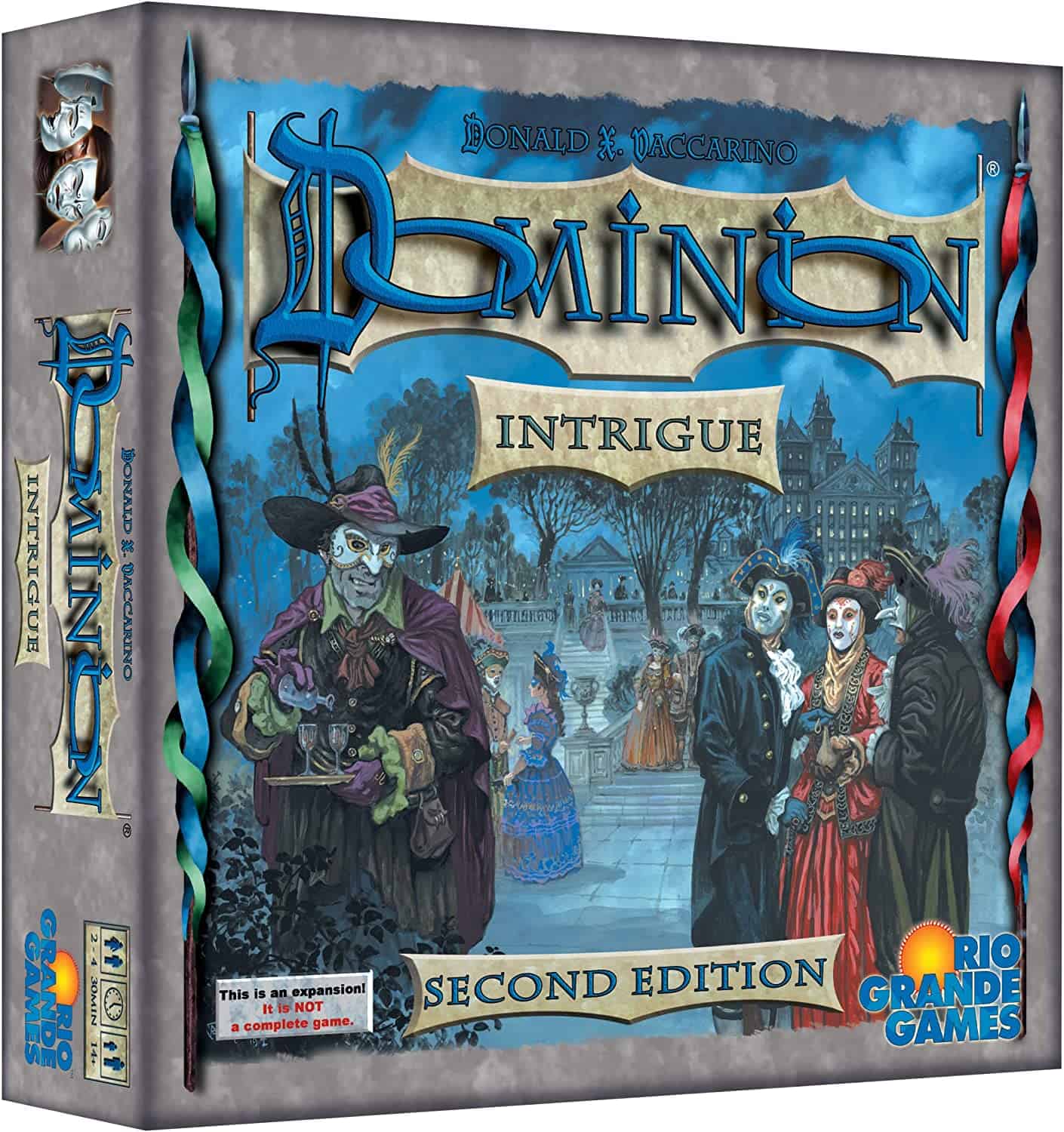
I’m a big fan of the first ever Dominion expansion, Intrigue. This was initially brought out as a standalone game, but I would recommend buying the second edition of Intrigue, which is an expansion and requires the base set.
Intrigue is one of my favorites as it encourages much more interaction between players with additions like Masquerade and Swindler. There’s also much more deck manipulation — opportunities to reorder, discard, and trash much more cards — making Intrigue a much more strategic version of Dominion.
Dominion: Prosperity
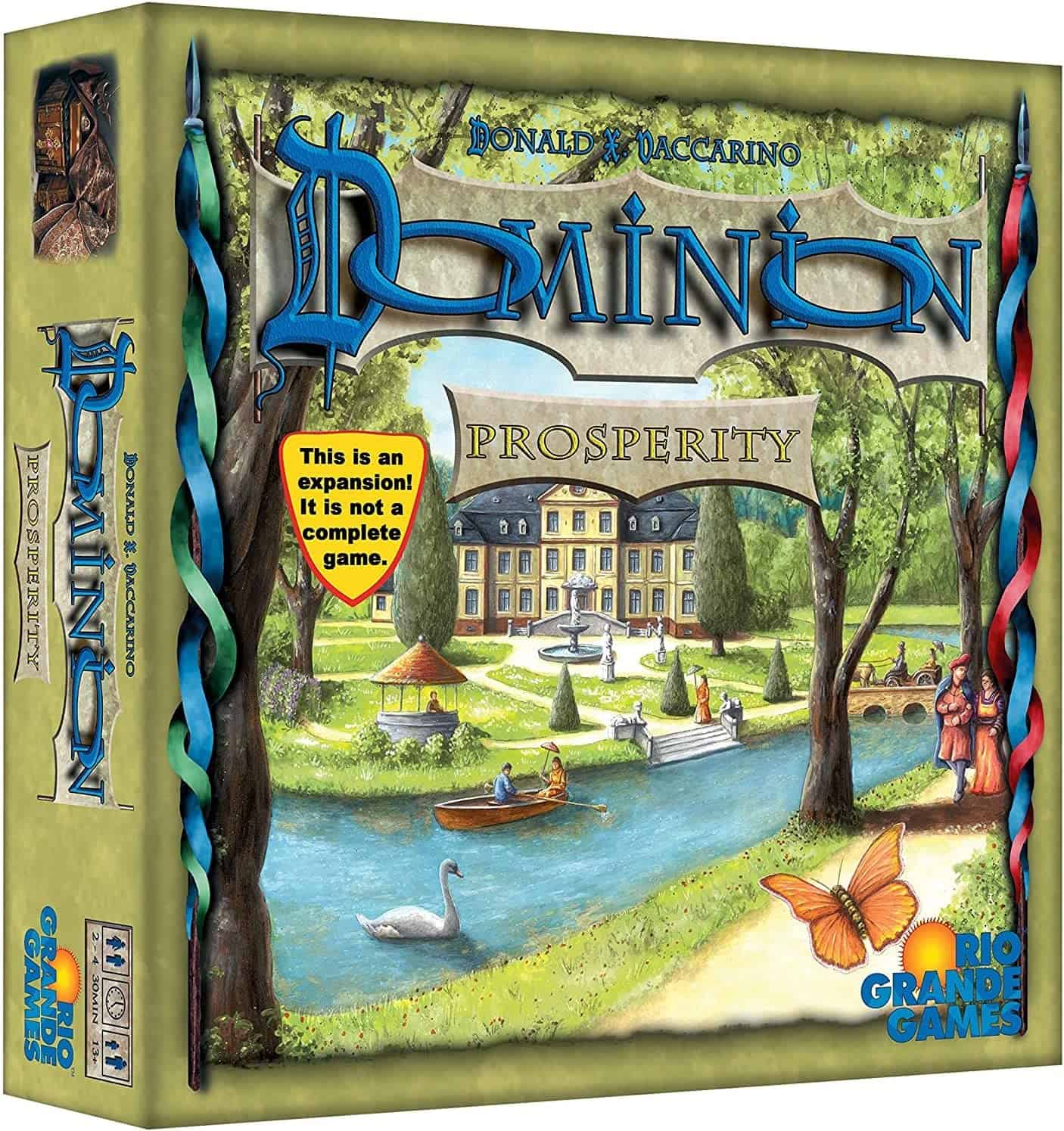
I personally think everyone should pick up Prosperity and include it in most games, since it adds a Platinum Treasure card worth five coins and a Colony Victory card worth eleven VP, both of which can make for some interesting and slightly longer games.
In addition to these basic cards, there are some powerful Kingdom cards thrown in the mix costing seven or eight coins, including my favorite, King’s Court, which lets you play an action in your hand three times — cool, right?
Dominion: Dark Ages
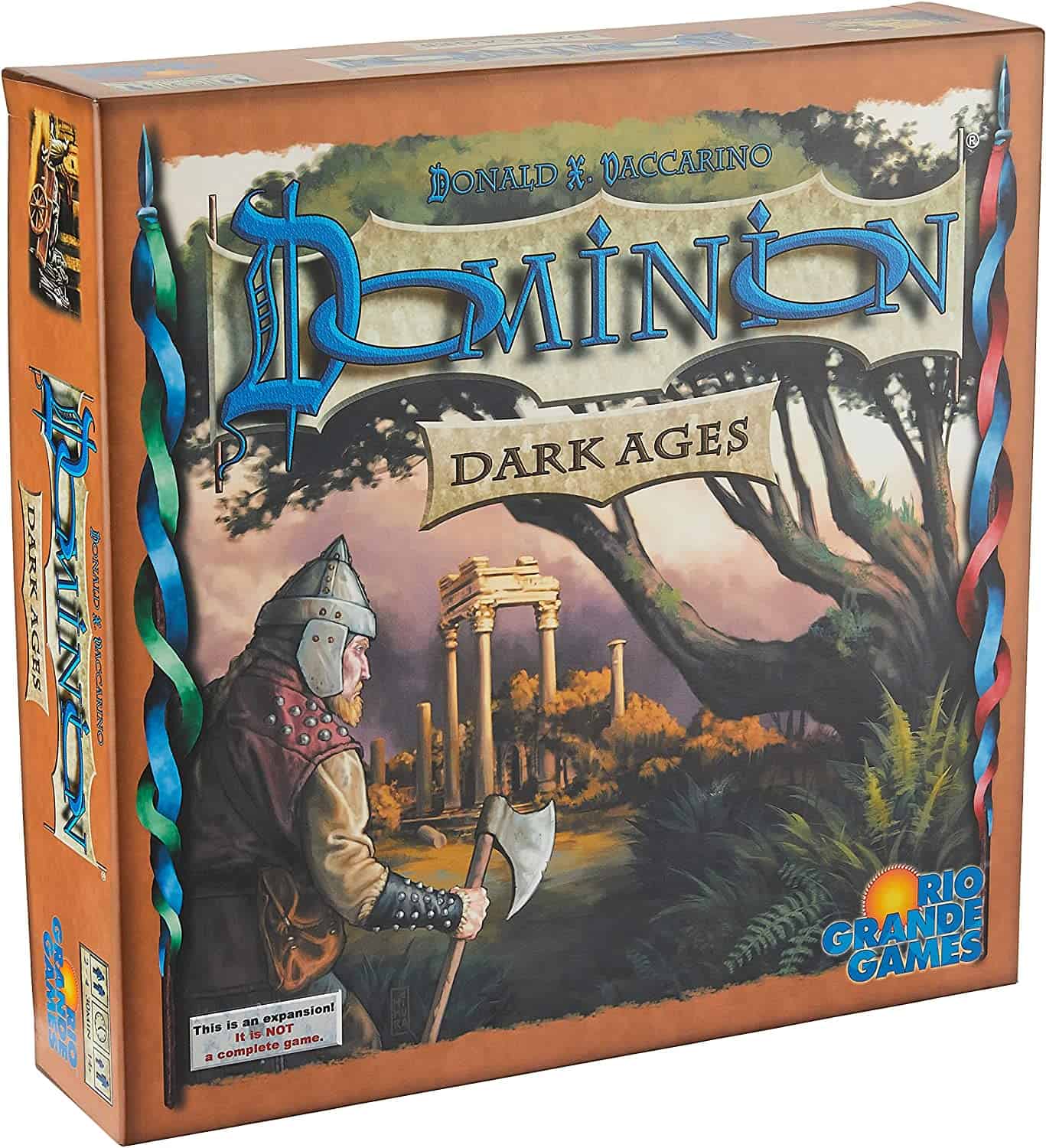
Rats. Never ending rats. And so much trash. Dark Ages was the first Dominion expansion I bought, so I have a soft spot for it, but I think it does some really clever things with its theme.
Dark Ages has a faux medievalism theme with lots of cards making use of the trash and adds a bunch of card types not included in the supply such as Ruins, Knights, and Spoils. But my favorite mechanic is the Rats card, which is a great card but forces you to pick up more Rats and trash a card from your hand, so that Rats eventually ‘infest’ your deck, a nice touch.
Dominion: Nocturne
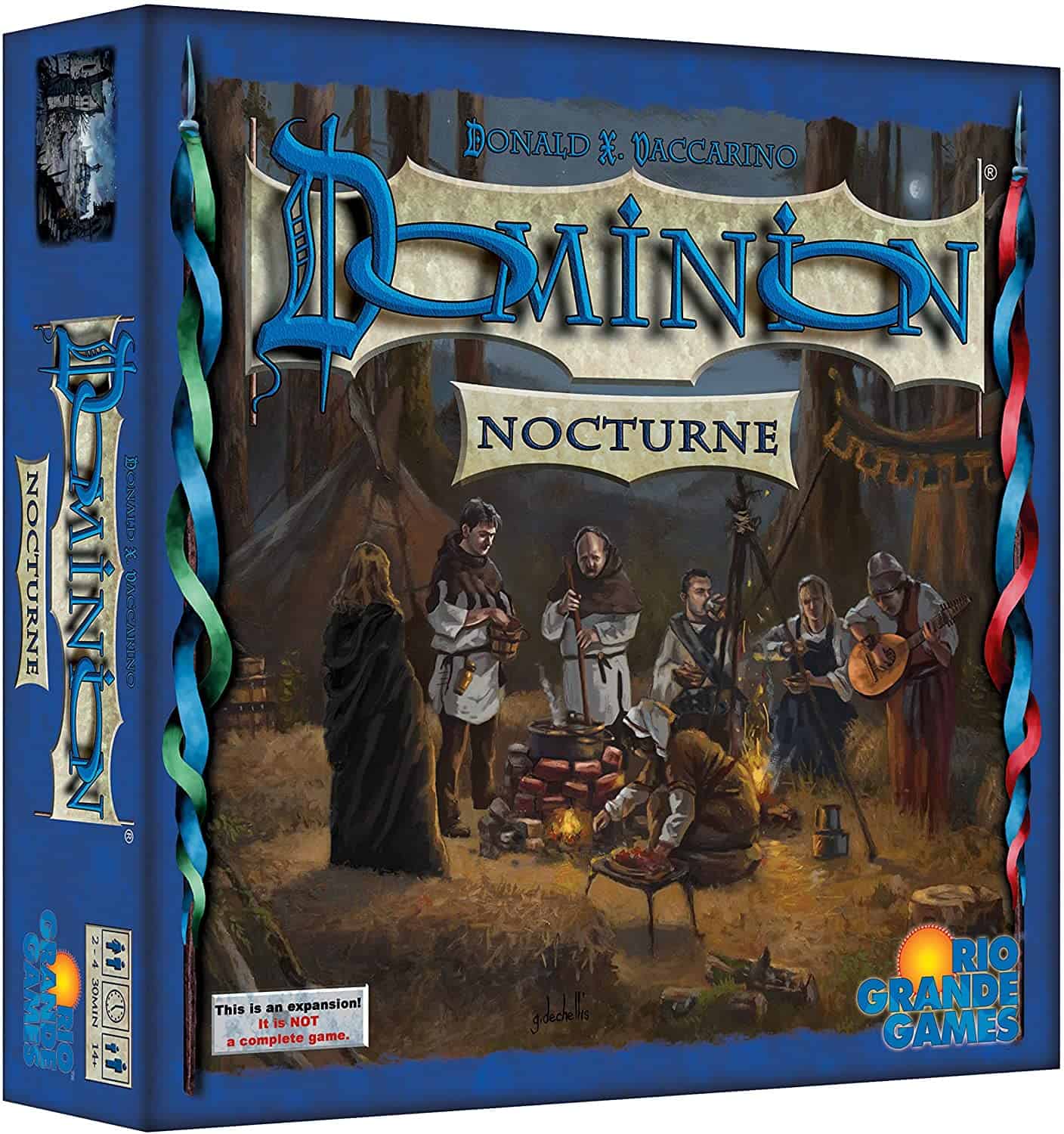
Nocturne is the expansion to buy when you’re ready to really kick things up a notch. In addition to adding plenty of new cards and mechanics, Nocturne adds an additional phase to gameplay, Night, which comes after the Buy phase.
During this phase you can play Night cards from your hand, as many as you like, and these give you bonuses, such as additional actions, on your next turn. The art and mechanics of these cards are really fitting for the theme and make a great addition to the game.
The Best Games like Dominion
Clank!
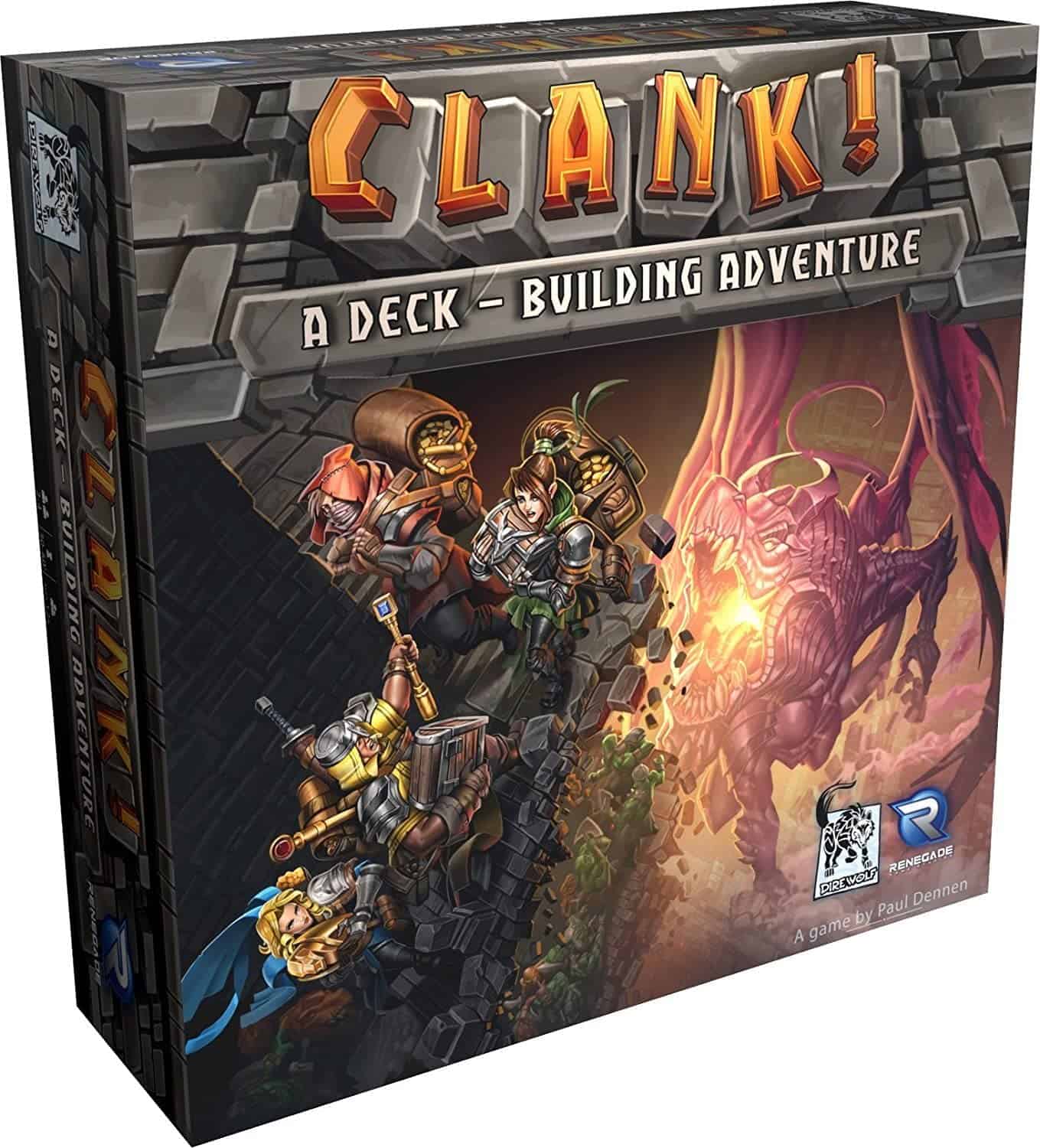
No. of players: 2-4
Designer: Paul Dennen
Approx. play time: 30-60 mins
Clank: A Deck-Building Adventure is deck building meets dungeon crawling — what else could you wish for? Use your deck to sneak deeper and deeper into the dungeon, collect treasure, and fight monsters.
The twist in Clank! is that moving around a dungeon creates noise and all those ‘clanks’ of sword fights and dropped treasure will eventually wake up the big sleeping dragon at the bottom of the dungeon. When he wakes up, the whole dungeon will be full of fire and anyone still there loses the game. This twist means Clank!, like Dominion, combines deck building with a strategy largely built on how long the game will last. If you can escape the dungeon, the player with the most treasure wins.
I’m a big fan of this game and its campaign version, Clank!: Legacy – Acquisitions Incorporated. Both games are fun for experienced gamers but also perfect introductions to board games for newbies and families.
Aeon’s End (2nd edition)
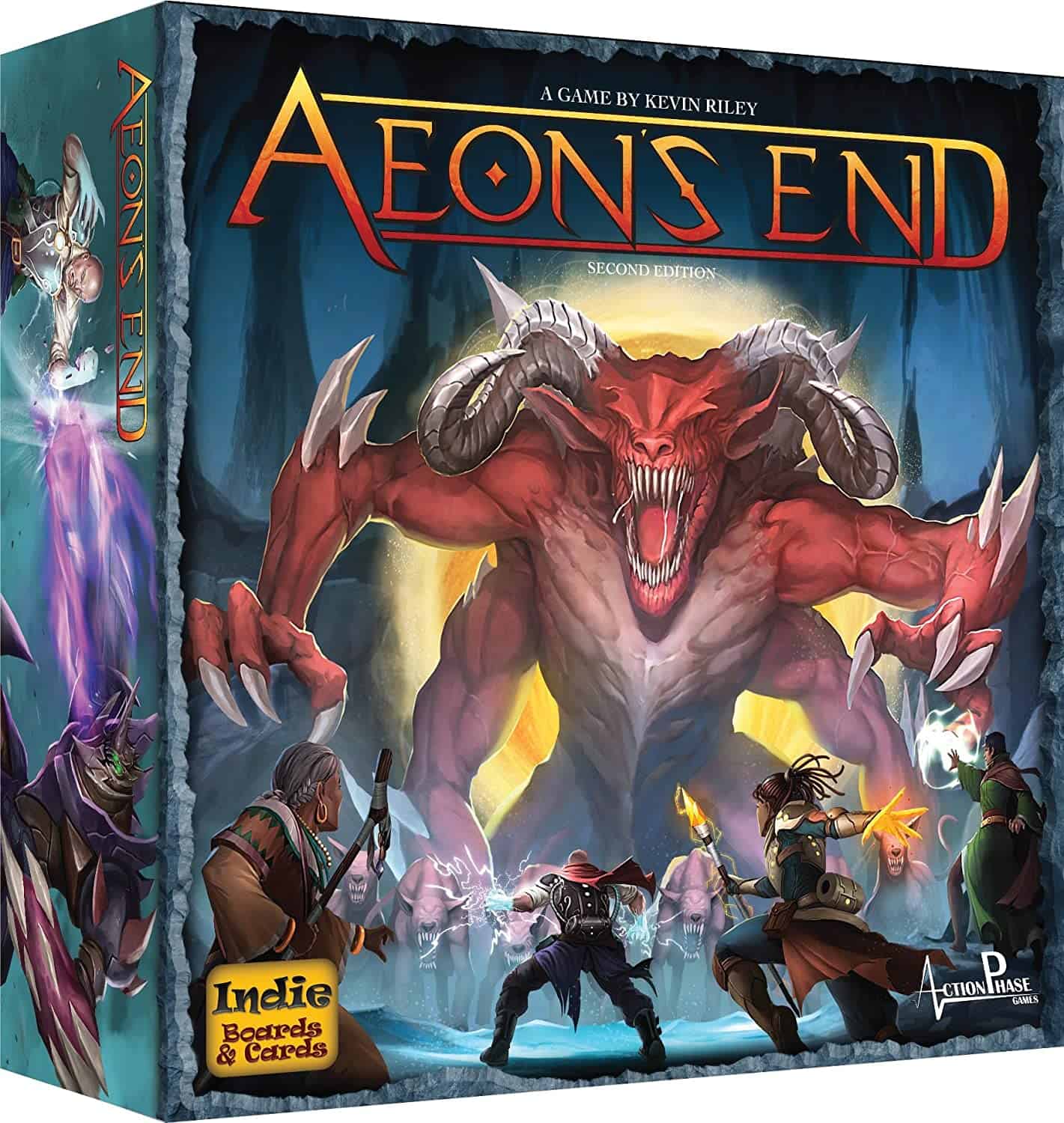
No. of players: 1-4
Designer: Kevin Riley
Approx. play time: 1 hour
Aeon’s End is one of my favorite board games and it deserves way more love. Like Dominion, it has deck-building elements and a shop of cards for your deck that can be altered in each game, though they don’t change the game as dramatically as a change of shop in Dominion does.
Rather than using that finely tuned deck to buy victory points, you’ll be working with your fellow players as warlocks taking down a dark enemy, using the spells and relics in your hand. This is an intense, co-operative game and the second edition comes with a range of monsters (which are tough to beat) and a good selection of characters to play as, each with their own special ability.
Working together, you’ll chip away at the enemy’s health and defeat their minions, all while protecting yourselves and the town of Gravehold. And if you love Aeon’s End, there’s now TWO campaign board game versions: Aeon’s End: Legacy and Aeon’s End: Legacy of Gravehold.
7 Wonders
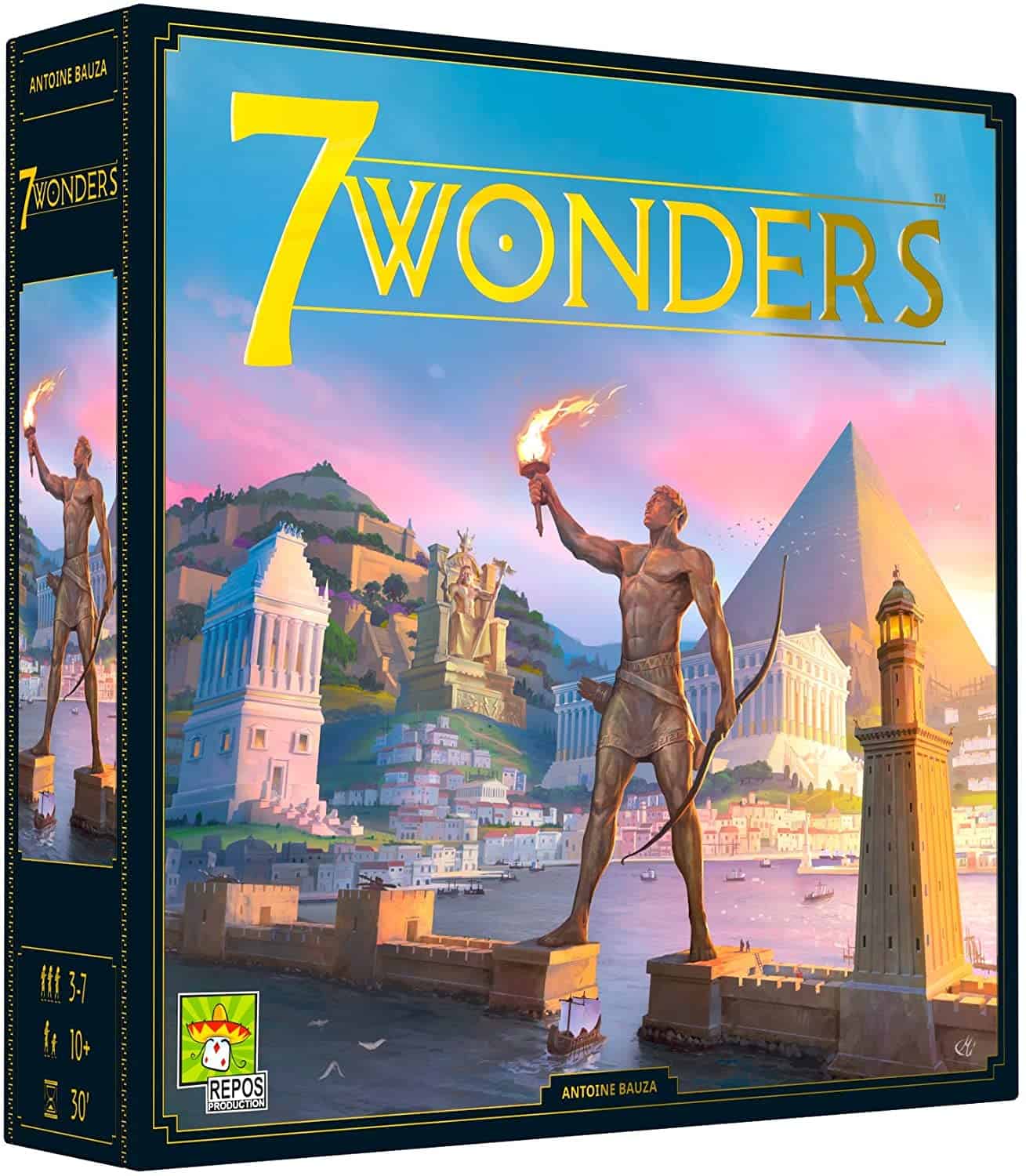
No. of players: 2-7
Designer: Antoine Bauza
Approx. play time: 30-45 mins
Okay, so 7 Wonders isn’t a deck-building board game like Dominion, it’s a card drafting game, but the thematic and technical elements of this game will definitely draw in any Dominion fan. Plus, like Dominion, 7 Wonders is a classic lightweight yet rewarding Euro game.
Here’s the lowdown. 7 Wonders takes place over three ‘ages’, in which players are each given seven cards, they pick a card, reveal their chosen card, and then pass the hand to the next player — a ‘pick and pass’ mechanic similar to Sushi Go!. These cards will help you gain resources, build up your military, develop your civilization, and ultimately score enough victory points to win the game.
7 Wonders is a really slick and satisfying board game. While it works for 2 players, 3-5 is the best number of players. If you usually play with just one other person, I’d highly recommend picking up 7 Wonders: Duel instead.
Star Realms
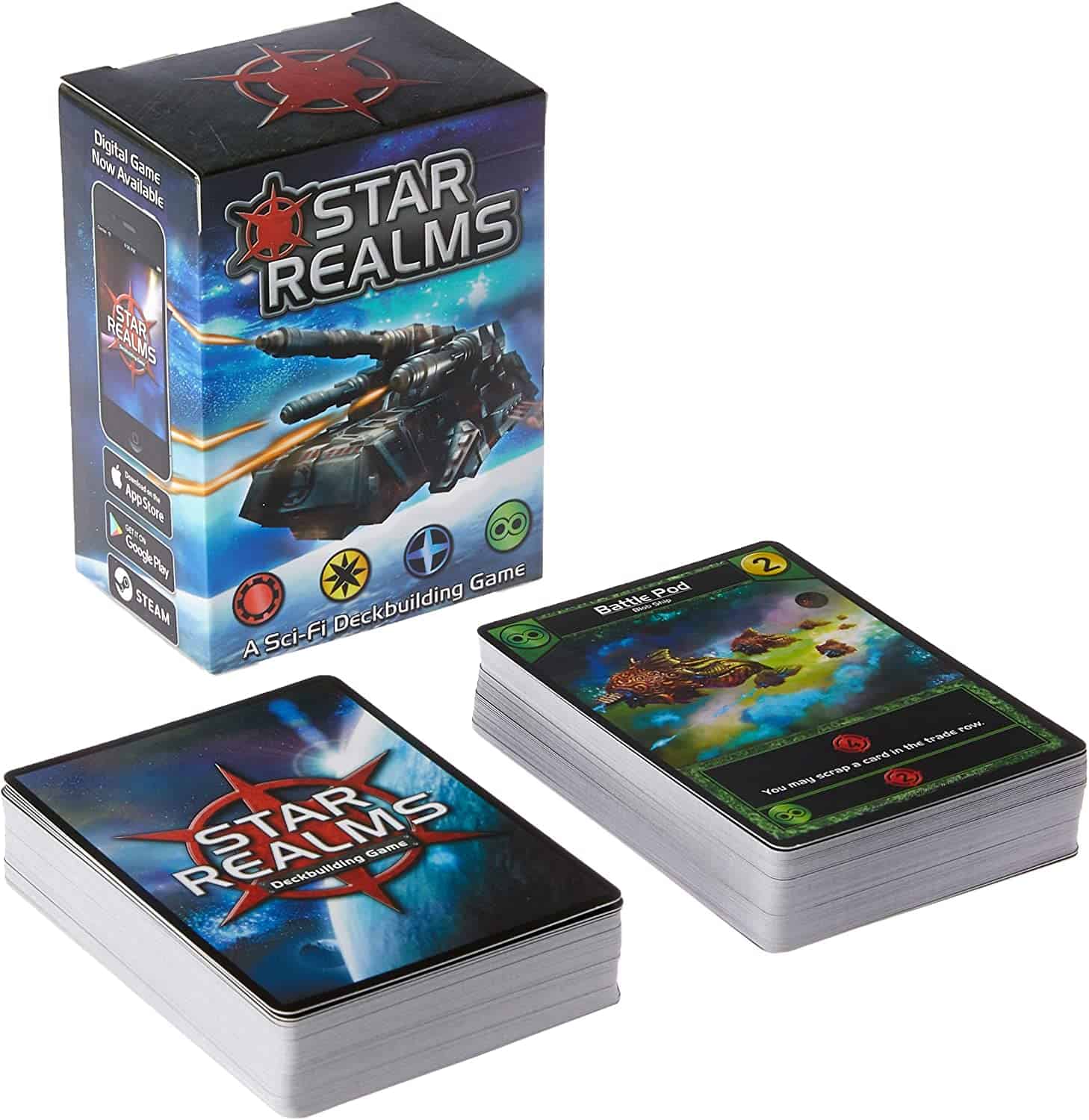
No. of players: 1-2
Designer: Robert Dougherty and Darwin Kastle
Approx. play time: 20 mins
If you’ve ever played Dominion and thought: this is great, but I wish it had more spaceships, then Star Realms is for you. This 2-player deck-building game has the same simple mechanics as Dominion — draw five cards and then use them to trade, attack, or gain Authority. Simply reduce your opponent’s Authority to zero to win the game.
The rules may be simple, but Star Realms is deceptively strategic, especially once you have a few games under your belt. Unlike Dominion, you rarely shuffle your deck in Star Realms, so there’s an element of leveraging the exact order of your deck when purchasing to maximize your hand’s potential each turn.
Star Realms has a solo mode, which makes this regular solo gamer very happy. It also has plenty of expansions, with Frontiers being my favorite, though Colony Wars is also great. And if you play with a larger group, the rulebook offers variants for using multiple packs of Star Realms to play with up to six players.
Sorcerer City
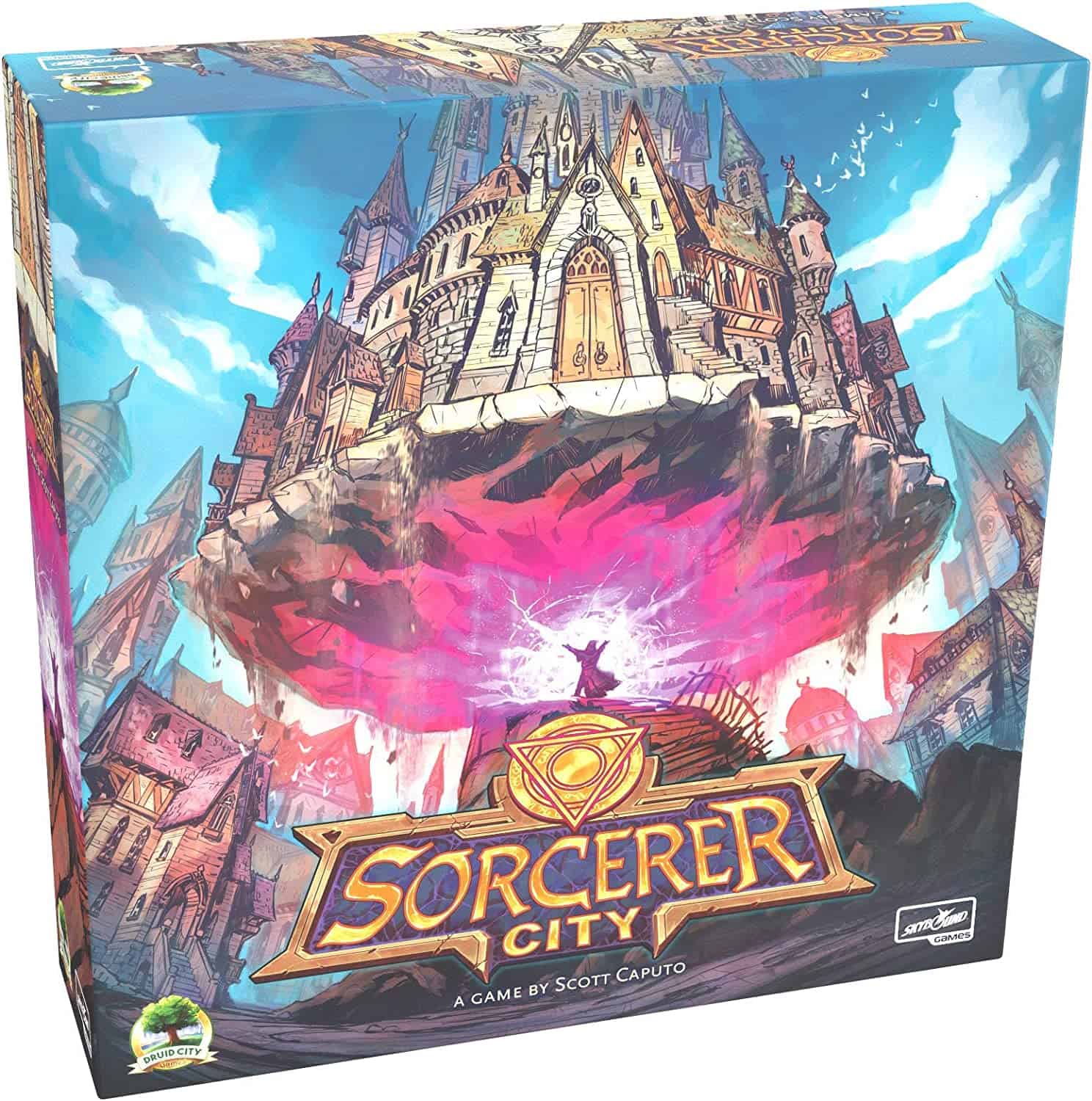
No. of players: 1-6
Designer: Scott Caputo
Approx. play time: 45-60 mins
I tend to describe Sorcerer City as a cross between Dominion and Carcassonne. It has deck building AND tile placement, with players taking on the role of wizard architects building a city.
The game takes place over five ‘years’, and each year you have two minutes to randomly draw and place your city tiles, your ‘deck’, and point-scoring city. In between placing, you’ll have the chance to add tiles to your deck but you’ll add monsters too, which negatively affect your city in future rounds.
It took me a little while to warm to Sorcerer City, mostly because timers stress me out, but once I became more familiar with the tiles and their mechanics, I saw how intelligently strategic this game could be and just how adjacent it is to Dominion.
Frequently Asked Questions
Question: Which edition of Dominion should I buy?
Answer: You should buy the second edition of Dominion. This is the most recent, up-to-date version and the most readily available.
Question: Is Dominion similar to CATAN?
Answer: No. Dominion is a deck-building card game, whereas CATAN is a dice rolling and hand management game, so these games have different mechanics. That said, if you like CATAN, I would highly recommend picking up Dominion so you can try out another excellent Euro game with a similar difficulty level.
Question: Is Dominion good for two players?
Answer: Yes. I have played a lot of 2-player Dominion games and always enjoy them. If you usually play with one other person, you should add Dominion to your repertoire!
Question: Which Dominion expansion should I buy first?
Answer: Either Intrigue or Seaside. Intrigue is the easiest expansion as it doesn’t introduce any particularly new mechanics to the base game. But Seaside is a great step up from the base game and is still a great expansion for beginner gamers and families, while adding enough complexity for strategic gamers.
Recommended reads:
- Everdell Board Game Guide and Review - August 30, 2023
- Root Board Game Guide and Review - August 17, 2023
- Gloomhaven Board Game Guide and Review - August 16, 2023

